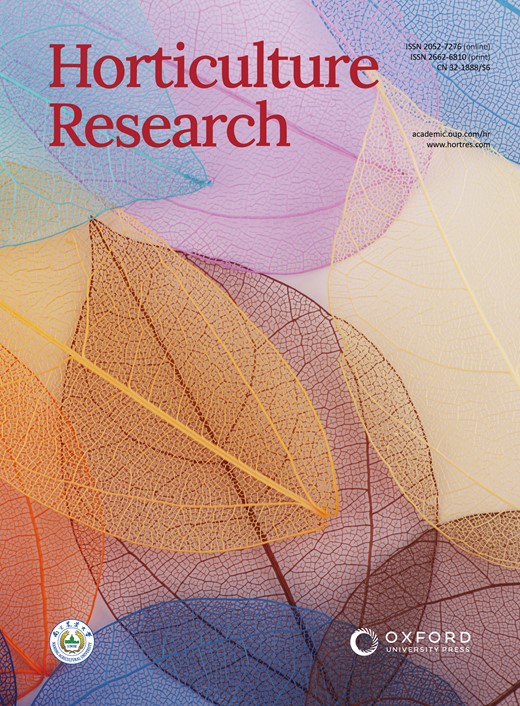Genome-wide association study of salicylic acid provides genetic insights for tea plant selective breeding
IF 8.7
1区 农林科学
Q1 Agricultural and Biological Sciences
引用次数: 0
Abstract
Salicylic acid (SA) is a phenolic phytohormone widely believed to regulate plant growth and stress response. Despite its significance, the genetic basis of SA-mediated resistance to biotic stressors in tea plants is little understood. Our study investigated the genetic diversity, population structure, and linkage disequilibrium (LD) patterns of 299 tea accessions using 79 560 high-quality single nucleotide polymorphisms (SNPs) obtained from genotyping-by-sequencing (GBS) data. Our genome-wide association study identified CSS0033791.1, an essential gene encoding 9-cis-epoxycarotenoid dioxygenase (CsNCED1), which catalyzes a vital step in abscisic acid (ABA) biosynthesis. Exogenous ABA treatment and transgenic overexpression of the CsNCED1 gene lowered SA content in the respective tea plants by inhibiting the expression of the ICS gene. Further analysis revealed that ABA could reduce the expression levels of the SA receptor gene (NPR1) and NPR1 target genes (PR1 and WRKY18), increasing the plant’s susceptibility to biotic stressors. Furthermore, the feeding behavior of Spodoptera litura (S. litura) revealed that the insect bite area on transgenic leaves was substantially more extensive than that in wild-type, implying that the CsNCED1 gene had a negative regulatory role in SA-mediated immune response. This study thus provides the foundation for future insect resistance breeding, sustainable tea plant resource usage, and molecular marker-assisted (MAS) tea plant breeding.求助全文
约1分钟内获得全文
求助全文
来源期刊

Horticulture Research
Biochemistry, Genetics and Molecular Biology-Biochemistry
CiteScore
11.20
自引率
6.90%
发文量
367
审稿时长
20 weeks
期刊介绍:
Horticulture Research, an open access journal affiliated with Nanjing Agricultural University, has achieved the prestigious ranking of number one in the Horticulture category of the Journal Citation Reports ™ from Clarivate, 2022. As a leading publication in the field, the journal is dedicated to disseminating original research articles, comprehensive reviews, insightful perspectives, thought-provoking comments, and valuable correspondence articles and letters to the editor. Its scope encompasses all vital aspects of horticultural plants and disciplines, such as biotechnology, breeding, cellular and molecular biology, evolution, genetics, inter-species interactions, physiology, and the origination and domestication of crops.
 求助内容:
求助内容: 应助结果提醒方式:
应助结果提醒方式:


